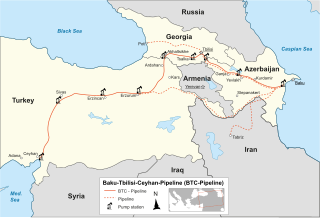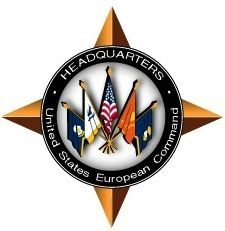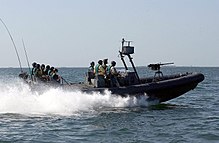
The Armed Forces of Armenia, sometimes referred to as the Armenian Army, is the national military of Armenia. It consists of personnel branches under the General Staff of the Armenian Armed Forces, which can be divided into two general branches: the Ground Forces, and the Air Force and Air Defense Forces. Though it was partially formed out of the former Soviet Army forces stationed in the Armenian SSR, the military of Armenia can be traced back to the founding of the First Republic of Armenia in 1918. Being a landlocked country, Armenia has no navy.

The Armed Forces of the Republic of Kazakhstan is the unified armed forces of Kazakhstan. It consists of three branches as well as four independent formations. The National Guard, Civil Defense, Border Service and the State Security Service serve as militarized affiliates of the armed forces. The national defence policy aims are based on the Constitution of Kazakhstan. They guarantee the preservation of the independence and sovereignty of the state and the integrity of its land area, territorial waters and airspace and its constitutional order. The armed forces of Kazakhstan act under the authority of the Kazakhstan Ministry of Defence.

The Baku–Tbilisi–Ceyhan (BTC) pipeline is a 1,768 kilometres (1,099 mi) long crude oil pipeline from the Azeri–Chirag–Gunashli oil field in the Caspian Sea to the Mediterranean Sea. It connects Baku, the capital of Azerbaijan and Ceyhan, a port on the south-eastern Mediterranean coast of Turkey, via Tbilisi, the capital of Georgia. It is the second-longest oil pipeline in the former Soviet Union, after the Druzhba pipeline. The first oil that was pumped from the Baku end of the pipeline reached Ceyhan on 28 May 2006.

The Azerbaijan Navy is the naval component of the Azerbaijani Armed Forces operating in the Caspian Sea.

The State Partnership Program (SPP) is a joint program of the United States Department of Defense (DoD) and the individual states, territories, and District of Columbia. The program and the concept are entirely new, originating in 1993 as a simplified form of the previously established (1992) Joint Contact Team Program (JCTP). The JCTP aimed at assisting former Warsaw Pact and Soviet Union Republics, now independent, to form democracies and defense forces of their own. It featured long-term presence of extensive and expensive teams of advisory specialists. The SPP shortened the advisory presence to a United States National Guard unit of a designated state, called a partner, which would conduct joint exercises with the host. It is cheaper, has a lesser American presence, and can comprise contacts with civilian agencies. Today both programs are funded.

The Trans-Caspian Gas Pipeline is a proposed subsea pipeline between Türkmenbaşy in Turkmenistan, and Baku in Azerbaijan. According to some proposals it would also include a connection between the Tengiz Field in Kazakhstan, and Türkmenbaşy. The Trans-Caspian Gas Pipeline project would transport natural gas from Turkmenistan and Kazakhstan to European Union member countries, circumventing both Russia and Iran. It would do this by feeding the Southern Gas Corridor. This project attracts significant interest since it would connect vast Turkmen gas resources to major consumers Turkey and Europe.

The United States and the Republic of Kazakhstan established diplomatic relations on December 16, 1991. The United States opened its embassy in Almaty in January 1992 and then relocated to Astana in 2006.
Terrorism in Central Asia is largely a cross-border phenomenon. The source of most terrorists and terrorist organizations that operate in Central Asia is Afghanistan due to the presence of the Taliban, and more formerly, Al Qaeda militants, as well as the Ferghana Valley due to the Tajik Civil War.
Brenda Shaffer is an American scholar who holds positions as Fellow with the Atlantic Council and professor at University of Haifa. Shaffer was the former research director of the Caspian Studies Program at Harvard's Kennedy School of Government and past president of the Foreign Policy Section of the American Political Science Association. She specializes on energy in international relations and energy policy in the Caspian region and has written or edited several books of these topics, including "Energy Politics" and "Beyond the Resource Curse." Shaffer has also written a number of books on the topic of identity and culture in the Caucasus including explorations of Azeri literature and culture. She has been accused of lobbying for Azerbaijan and failing to disclose conflicts of interest.
The threat of terrorism in Kazakhstan plays an increasingly important role in relations with the United States which in 2006 were at an all-time high. Kazakhstan has taken Uzbekistan's place as the favored partner in Central Asia for both Russia and the United States. Kazakhstan's counter-terrorism efforts resulted in the country's 94th ranking among 130 countries in the 2016 Global Terrorism Index published by the Institute of Economics and Peace. The higher the position on the ranking is, the bigger the impact of terrorism in the country. Kazakhstan's 94th place puts it in a group of countries with the lowest impact of terrorism.

The State Border Service of Azerbaijan Republic, also known as Border Guard of Azerbaijan, is a governmental law enforcement agency in charge of protecting the borders of Azerbaijan. The Chief of State Border Service and Commander of Border Troops is Colonel-General Elchin Guliyev. Other law enforcement bodies in Azerbaijan include the Internal Troops of Azerbaijan and the Azerbaijani National Guard.

According to the 2012 U.S. Global Leadership Report, 53% of Azerbaijanis approve of U.S. leadership, with 27% disapproving and 21% uncertain.

Turkmenistan – United States relations are bilateral relations between Turkmenistan and the United States.

The Caspian Sea is the world's largest inland body of water, often described as the world's largest lake or a full-fledged sea. An endorheic basin, it lies between Europe and Asia; east of the Caucasus, west of the broad steppe of Central Asia, south of the fertile plains of Southern Russia in Eastern Europe, and north of the mountainous Iranian Plateau of Western Asia. It covers a surface area of 143,550 sq mi (372,000 km2) and a volume of 78,200 km3 (19,000 cu mi). It has a salinity of approximately 1.2%, about a third of the salinity of average seawater. It is bounded by Kazakhstan to the northeast, Russia to the northwest, Azerbaijan to the southwest, Iran to the south, and Turkmenistan to the southeast.

Foreign relations exist between Azerbaijan and Kazakhstan. Azerbaijan has an embassy in Astana and a consulate in Aktau. Kazakhstan has an embassy in Baku.

The United States European Command State Partnership Program, according to its own mission, is a National Guard program that "links U.S. states with designated partner countries to ... support the command’s security cooperation objectives." Currently, 22 Partnerships exist "with former Soviet, Yugoslav and Warsaw Pact countries in the EUCOM Area of Responsibility." Becoming independent on the dissolution of the Soviet Union on December 26, 1991, these countries shortly requested the advice and assistance of the United States in creating new self-defense forces.

Relations between Turkic Council and Azerbaijan started from the year of 2009 until present. Taking into account of the establishment date of the organization, Azerbaijan continues relations as a member of the founding country.

The Border Service of the National Security Committee of the Republic of Kazakhstan is a governmental paramilitary force that manages the international borders of Kazakhstan. August 18 is celebrated as the Day of the Border Troops, which is the professional holiday of the Border service.

In the Soviet period, the Caspian Sea was practically an inland water basin within the Soviet Union's borders and washed off the coast of Iran only to the south. Until 1992, the status of the Caspian was regulated by the Soviet-Iranian treaties. After the collapse of the USSR, the emergence of the independent states of Azerbaijan, Kazakhstan and Turkmenistan raised the issue of dividing the Caspian Sea.
The 4th Region or the Northern Fleet is the flotilla of the Islamic Republic of Iran Navy in the Caspian Sea.

















